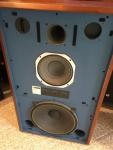Hi guys,
I need your urgent help!!!
This is related to my recent thread on the comparisons of two SG520 preamps,
one in near mint condition (A), and the other in good used condtion (B).
My puzzle was I hear brighter and clearer sound from the mid and high drivers, and tighter bass from the woofers from B than A.
And now I got the answer from the ebay seller who quoted his technician:
"The technician said the newer one (A) has not been played in a while prior to check up, but kept as a collectable. He said it takes about 2 months for the capacitors to reform and the unit will continue to improve in sound during this period."
What do you think? Is it worth for me to "reform" this capacitor? Can you reform by just playing this unit for a couple of months?
If not, is it just a hopefuless job and wise for me to just return this item to the seller? Thanks much for your advice in advance.




 Reply With Quote
Reply With Quote


 Look at the inside pic of this unit.
Look at the inside pic of this unit.

